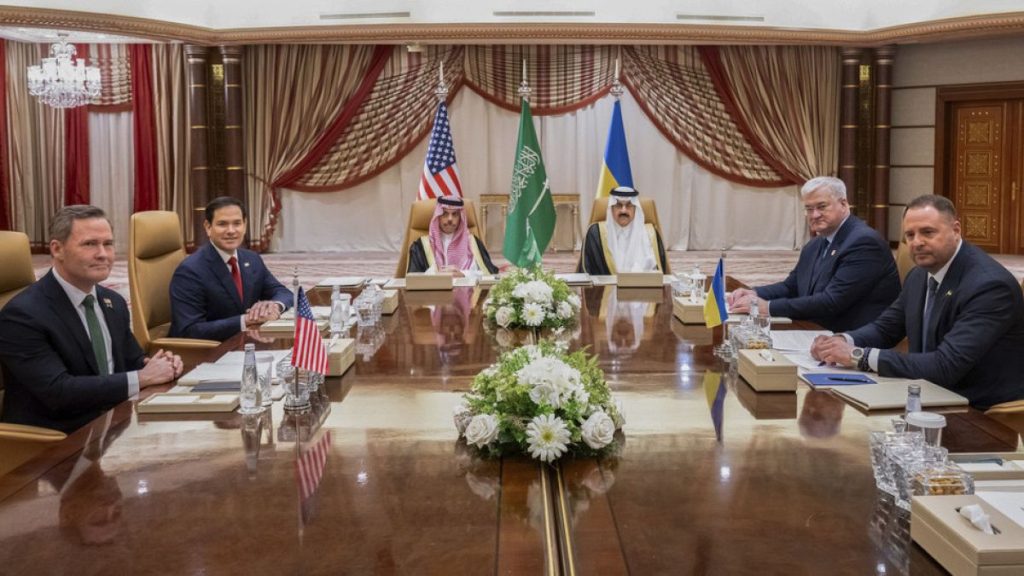Talks between US and Ukrainian delegations held in Riyadh recently yielded constructive outcomes, focusing on crucial matters such as energy security. Ukrainian Defence Minister Rustem Umerov characterized these discussions as “productive,” aimed at achieving a “just and lasting peace” for Ukraine and Europe. These meetings, which precede anticipated negotiations between US and Russian officials, reflect ongoing diplomatic efforts amidst ongoing conflict and calls for a ceasefire from Ukrainian President Volodymyr Zelenskyy.
| Article Subheadings |
|---|
| 1) Overview of the Riyadh Meetings |
| 2) Key Figures in the Talks |
| 3) Implications of the Ongoing Conflict |
| 4) International Reactions and Future Outlook |
| 5) Summary of Diplomatic Goals |
Overview of the Riyadh Meetings
The recent diplomatic engagement in Riyadh marked a key development in the ongoing dialogue surrounding the Ukraine conflict. Held a day before the US plans to meet with Russian representatives, the discussions have been characterized by Ukrainian officials as a step forward in addressing pressing issues, including energy security, amid the ongoing war. This meeting follows a previous gathering in Jeddah, where significant agreements were made concerning ceasefire conditions and military aid from the US to Ukraine. The role of Riyadh as a neutral venue for such high-stakes diplomacy underscores the Kingdom’s growing influence in international affairs.
Key Figures in the Talks
Leading the Ukrainian delegation, Defence Minister Rustem Umerov engaged in discussions with US officials, which included important figures such as Special Envoy Steve Witkoff. Umerov expressed optimism about the negotiations’ outcomes and emphasized President Volodymyr Zelenskyy’s goals for peace in Ukraine and Europe. The Ukrainian team comprised other high-ranking officials, including Oleksandr Karasevych, State Secretary of the Ministry of Foreign Affairs, and several deputy heads from the President’s Office. Their participation indicates a coordinated and strategic approach to securing Ukraine’s interests on the international stage.
Implications of the Ongoing Conflict
Despite these diplomatic efforts, the backdrop of the Ukraine conflict remains tumultuous. President Zelenskyy has accused Russian President Vladimir Putin of delaying ceasefire initiatives while continuing military aggression. This situation contrasts sharply with the discussions aimed at achieving a ceasefire. Zelenskyy has called for continued international pressure on Russia to facilitate what he refers to as a “genuine” ceasefire, highlighting the complexity of reconciling diplomatic dialogue with ongoing hostilities. The stark reality of the conflict necessitates that all parties involved navigate a precarious political landscape in pursuit of peace.
International Reactions and Future Outlook
Globally, the situation has garnered attention beyond the immediate parties involved, with European Union leaders discussing ways to enhance their collective defense mechanisms. The EU’s commitment to being capable of defending against Russian aggression by 2030 reflects a broader strategic shift in response to the evolving security landscape in Europe. As American officials continue to engage with their Ukrainian counterparts, there is an air of cautious optimism regarding the outcomes of the Riyadh meetings and their possible influence on upcoming discussions with Russian officials. This international dimension underscores the importance of collaboration in addressing security concerns and strengthening alliances.
Summary of Diplomatic Goals
The overarching diplomatic goal articulated by both Ukrainian and US officials is to establish a framework for lasting peace in the region. As discussions continue to unfold, emphasis remains on addressing specific challenges such as military aid and energy security. The outcome of these talks may serve as a critical turning point in the protracted conflict, especially with US officials expressing optimism towards the discussions in Riyadh. The course of future engagements will play a significant role in shaping not only Ukraine’s fate but also the stability of the broader European region.
| No. | Key Points |
|---|---|
| 1 | US and Ukrainian delegations held productive talks in Riyadh focusing on key issues including energy security. |
| 2 | Ukrainian Defence Minister Rustem Umerov emphasized the goal of achieving a just peace for Ukraine. |
| 3 | Brian W. Hocking of the US highlighted ongoing military aid and the need for international collaboration. |
| 4 | Zelenskyy has called for international pressure on Russia for a genuine ceasefire despite ongoing aggression. |
| 5 | EU leaders have agreed on the need to enhance defense capabilities by 2030 in response to Russian threats. |
Summary
The recent talks in Riyadh between US and Ukrainian delegations underscore the continued diplomatic efforts aimed at resolving the ongoing Ukraine conflict. As various stakeholders express their perspectives and goals, the need for a sustainable resolution remains paramount. The involvement of key international players signifies the intricate web of interests influencing the current geopolitical climate. The forthcoming discussions with Russian officials will be pivotal in shaping the trajectory of peace and stability in the region.
Frequently Asked Questions
Question: What are the main objectives of the recent talks in Riyadh?
The main objectives of the recent talks involved addressing pressing issues such as energy security, military aid, and establishing a foundation for a peaceful resolution to the Ukraine conflict.
Question: Who led the Ukrainian delegation in the talks?
The Ukrainian delegation was led by Defence Minister Rustem Umerov, who emphasized the importance of achieving a just and lasting peace for Ukraine and Europe.
Question: What international reactions were observed regarding the Ukraine conflict?
International reactions included calls from EU leaders for enhanced defense capabilities in response to the threat posed by Russia, indicating a united front among European nations.


